Profiles in Geriatrics
Profiles in Geriatrics
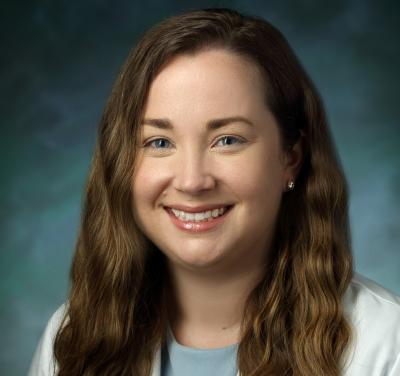
April Ehrlich, MD
Clinical Research Geriatric Fellow
Johns Hopkins University
Early Career Professional Member
I grew up in my family’s trailer park in rural Arizona raising cattle and sheep. If you told me then I would be a geriatrician one day, I would not have believed it. My first encounter with octogenarian
healthcare was with my Great Aunt Mary, who was my surrogate grandmother growing up, and taught me how to “eat like a lady.” When I was 9 years old, we went to visit her, but this time was different. The color was gone from her body, her hair was grey, and her eyes were closed. I was too afraid to talk to a woman I loved dearly. I didn’t know it then, but this was my first experience with home hospice. She died an hour after I left.
I carried the guilt of being afraid to say goodbye with me as I decided to go to college. I was involved in scientific research and interested in physiology, but something was missing. So, sort as of an amends for my 9-year-old self, I started volunteering for a hospice agency. My life changed in those years. I learned the value of a story, and what amazing stories they were. I learned about the struggles older adults face and how to hold their hands through it. I didn’t have the language at the time, but I learned to focus on what mattered most. I finally found the missing piece: passion.
In medical school, I sought out ways to increase my knowledge of healthcare for older adults. I found a mentor in Dr. Mindy Fain at the Arizona Center on Aging who taught me all about frailty and how care for the older adult requires complex understanding of the physiology of aging. She introduced me to the American Geriatric Society and accompanied me to my first meeting as a medical student in 2018. At that meeting I met many additional mentors including Dr. John Burton and members of the Johns Hopkins University Division of Geriatrics, who eventually became my colleagues during my residency at Johns Hopkins Bayview and subsequent fellowship with the division.
Over the years since that first meeting, I have been blessed to attend several in person meetings despite the pandemic, and to meet so many friends and colleagues across the country that make a difference for older adults ever day. This is why I am an American Geriatric Society member and have been since I was a student. It’s the people. There is a passion that is palpable in the AGS across all fields of geriatrics given the unifying goal of improving the health, independence, and quality of life of all older people. For instance, I may be researching ways to make surgery safer for older adults, but at the AGS I can not only share my piece of the puzzle, but also see the awesome work my colleagues are doing across fields, putting our pieces together to make a beautiful picture.
My joy I feel being a part of this community has led me to become involved in leadership and I am now starting my time as the new American Geriatrics Society Early Career Professional Ex Officio Board Member. I have finished my Clinical Geriatrics Fellowship and am now completing two years of research training as a Post-Doctoral Research Fellow supported by the NIA Training Program in Health Services and Outcomes Research for Aging Populations T32 under the mentorship of Dr. Cynthia Boyd and Dr. Esther Oh. I will also be pursing an MHS in Clinical Investigation at the Johns Hopkins Bloomberg School of Public Health.
I look forward to many years of forming great pictures of the future of geriatrics with my friends and colleagues in the AGS. As I look back on all the lessons my Great Aunt Mary taught me, I now know the value of her story and focusing on what mattered most to her in that time - being home surrounded by loved ones - was the most pivotal. It just took me some time and mentorship from other geriatricians, like those you meet in the AGS, to learn it. P
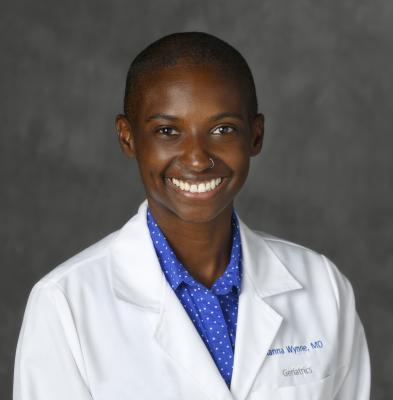
Brianna Wynne, MD
Assistant Professor of Geriatric Medicine
UF College of Medicine
Early Career Professional Member
"From the time I was a little kid, I’ve enjoyed science and learning about the human body. I knew that I wanted to be a physician at the age of five, because it seemed like such a great way to help others. Once I realized that being a doctor combined science, the body—and helping others—I knew it would be the perfect career trifecta for me.
During medical school, I had some amazing experiences helping care for older adults, and in my family medicine residency I was struck by the joy I felt when working with the geriatric population. I appreciated the wisdom and stories older adults shared with me, and their care often required me to think critically when I encountered their complex medical conditions and the many drugs they often took. Those experiences inspired me to pursue additional training in geriatric medicine to provide the very best care I could for this amazing patient population.
At my current job at the University of Florida, I split my time between inpatient geriatric consults and the outpatient geriatric clinic. It’s rewarding because I have the opportunity to work with medical students, residents, and geriatric fellows in each of these settings. Being a part of an academic institution allows me to participate in research as well, which I hope to get more involved in next semester.
I joined AGS as a family medicine resident in 2019, because I wanted to learn a bit more about the Society as I prepared to apply for my geriatric fellowship.
I’ve gained so much from my membership! For example, as a fellow last year, I was a part of the Fellows-In-Training section which provided me with networking opportunities and career guidance as I embarked on the interview process for faculty positions. For the upcoming year, I’m excited to be Chair of the FIT Committee, because I truly believe the key to our future success as a specialty is not only attracting people passionate for geriatrics but providing them with the tools they need to be successful.
I attended my first AGS Annual Scientific Meeting last year, and was I honored to present my research project, “Vitamin D Supplementation After Fracture,” as a virtual poster presentation. I thoroughly enjoyed listening to the various speakers and presentations and look forward to the chance to connect with folks in-person at #AGS22 in Orlando.
The meeting offers change-your-practice types of learning experiences. One of the most interesting talks I attended discussed the risks associated with long-term use of proton-pump inhibitors (PPIs), and after attending the lecture I became something of a champion for deprescribing unnecessary PPIs in the nursing home for the rest of my fellowship year.
In my off hours, I enjoy volunteering at my church, dancing, and spending time in nature. I’m an avid jogger and completed three marathons in three different states in the past few years and aim to do my next marathon in 2022."
Kieran McAvoy, MD
PGY-3, Internal Medicine-Geriatrics
Medical College of Wisconsin Affiliated Hospitals
Resident Member
"I guess you could say that becoming a doctor was in my genes—my father is a private practice solo physician in Wausau, Wisconsin and my mother was an emergency medicine nurse. I grew up in the healthcare system, and for as long as I can remember, I’ve wanted to go into medicine.
I became inspired by geriatrics during my med school training at the Medical College of Wisconsin, where I was lucky enough to have amazing mentors. In fact, in my very first year, Dr. Edmund Duthie, MD, the chief of MCW’s Division of Geriatrics/Gerontology, introduced me to AGS—he was a member of long standing—during the early weeks of classes.
As my interest in geriatrics grew, I found myself wanting to learn more about the field. The school had an apprenticeship program—you got to pick one specialist with whom you spent clinical time during your first and second year. I chose Dr. Angela Beckert, who’s now MCW’s program director in the internal medicine geriatrics track. So, between Dr. Duthie and Dr. Beckert, I got an indelible introduction to the field of geriatrics.
My personal life also paved the way for my decision to enter geriatrics. Very sadly, during medical school, my mother was diagnosed with Younger-Onset Alzheimer’s disease. The challenges that came from this difficult family experience led to my interest in working with people who have neuro-cognitive impairment, and geriatrics combines that interest with an internal medicine focus.
I’m finding the field extremely rewarding. Recently, I was appointed as the American Medical Association’s Resident and Fellow Section chair—and as exciting as that appointment is, it’s even more exciting because I’m the first geriatrics fellow to hold that post. It’s an honor to be elected and to represent my field next year.
Another rewarding aspect of my career is working with trainees. I enjoy mentoring them—helping them publish and encouraging them to get involved in healthcare advocacy and policy.
For me, membership in the AGS was invaluable when I was a trainee. And I’m sure that my AGS membership will be even more valuable when I’m a young physician starting out to practice.
Of course, another huge benefit of AGS membership is the Annual Scientific Meeting. Due to the pandemic, my first meeting was a virtual one—but we all made it work. I volunteered with organizing the Residents’ Section activities, I moderated a Q & A session with geriatrics fellows, and I presented one of my clinical vignettes. Now that I’m 20 weeks pregnant, I’m not sure if I’ll be able to make it to #AGS22 in Orlando in May—but I’m sure going to try!
I feel that the best part about AGS membership is how it enables us to advocate for older adults. It gives us a seat at the table where the decisions about our patients’ welfare are made.
As busy as my professional life is, my personal life is also happily hectic. My husband and I are the proud dog parents of four rescue pups, who keep us active walking and playing outside. We also love to cook and try new recipes together, and we enjoy kayaking and cycling."
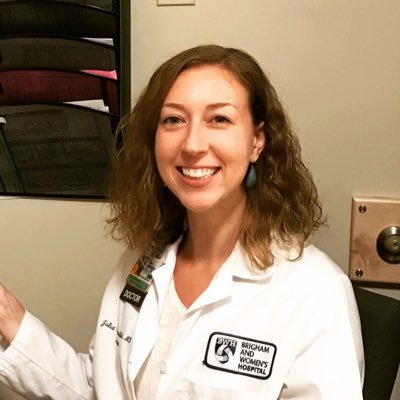
Julia Loewenthal, MD
Geriatric Medicine Fellow
Beth Israel Deaconess Medical Center
Fellow-in-Training Member
Tell us a patient care story where your geriatrics training was especially useful.
A few months ago, I had recently graduated from the Harvard Multi-Campus Geriatrics Fellowship, and I was flying off for vacation when drama ensued. Over the speaker came the question: “Is there a doctor or nurse onboard?”
I was the only physician on board, and I answered the call along with a cardiac nurse. We discovered our patient was a middle-aged passenger in the throes of crushing chest pain. We managed to stabilize the passenger and recommended that the plane divert for landing. Thankfully, the passenger made it to the hospital alive.
I’d done plenty of emergency simulations during my internal medicine residency at Brigham and Women’s Hospital, but this situation demonstrated how my geriatrics training was particularly helpful. As a geriatrics fellow, we learned how to handle cases where there’s a lot of ambiguity. Geriatrics teaches you how to embrace whatever happens and how to provide compassionate care for an older person, the family—and yourself.
That’s an incredible story. What happened next?
I knew that my experience would be useful to other healthcare providers, so I tweeted out anonymized details of the in-air rescue, using the “tweetorial” format because it allowed me to tell the story in a way that suited the case. I had originally started using Twitter to keep up with research literature, because it helped me read more articles and engage in discussions about them.
But then my tweets went viral! I thought my 20 or so followers would enjoy reading about my experience—but I ended up getting over 18,000 “likes” and just over two million total views. The response was overwhelming. I heard from lots of folks who’d been in similar situations—even a former surgeon general left a comment.
It seems like this is a lesson in the power of social media as a tool for clinicians.
Social media has a positive role to play in our medical careers. It gives professionals who aren’t researchers a voice and a platform to share their experiences. Typically, researchers have always had a place to share their work, but I think using social media helps give us all a forum—particularly for stories that may not fit neatly in a journal.
How has your openness about your experiences on social media translated into your professional life?
In some respects, that same openness is what makes a community like the AGS so important. I became an AGS member right after I decided to apply for a geriatrics fellowship in my last year of residency. I hadn’t met a lot of people who were interested in geriatrics, so this was a great way to meet like-minded folks. Once I joined, I found lots of online groups to engage with and share ideas with.
For instance, at #AGS19 in Portland, I presented some of my research, and attended the Healthy Aging Special Interest Group session. I had the wonderful opportunity to hear Louise Aronson, MD speak about using personal narratives and how stories can impact our practice.
Looking ahead to the future, I can see how the trajectory of geriatrics is trending toward the positive. It used to be that we focused on the ‘negative’ syndromes, like falling, incontinence, and dementia. Now we’re also focused on healthy aging, and I look forward to helping my patients realize the positive aspects of the aging process.
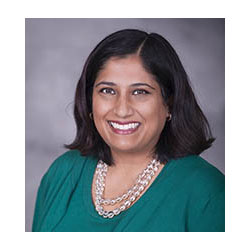
Mandi Sehgal, MD
Associate Professor of Geriatric Medicine
Florida Atlantic University
Physician Member
It seems most geriatrics professionals have a personal reason for the choices they’ve made in a career path. What brought you to the field?
My interest in geriatrics was inspired by my especially loving relationship with my maternal grandmother. I’d decided to become a doctor, and as I progressed through residency, my grandmother became ill and frail. I didn’t live close to her, yet I could see how fragmented her care became. It was frustrating that I didn’t have the tools to help her.
That sparked my realization that while I had great skill in being able to care for children and middle-aged adults, I didn’t feel so confident caring for older people. I felt that specializing in geriatrics would give me the tools I needed. I discussed this with Dr. Ken Brummel-Smith, the chair of the department of geriatrics at my medical school, Florida State University. He encouraged me to pursue and apply for a geriatrics fellowship position.
How has AGS membership helped you as you’ve navigated your career?
I joined AGS as soon as I became a geriatrics fellow and I can say honestly that membership has enhanced every single aspect of my professional life. Just for starters, AGS gives me access to countless resources and to a community of people, all dedicated to making the lives of older adults better. And that makes me a better geriatrician.
For example, in addition to my “day job,” I’m Chair of the AGS Teachers Section and in that role, I communicate through the MyAGSOnline Teachers Section Community to engage other AGS educators. It’s a fantastic tool for so many needs—it’s a great way to find reviewers for your abstract, for example. And if you have a query, you can put it out to this large group of amazing people and are sure to get scores of helpful answers in return.
What do you enjoy most about teaching?
I think it’s a privilege to teach others how to care for older adults. It’s something that health care professionals think they know how to do, but when you show them the nuances, you see all these lightbulbs go off in their heads.
In my teaching work, I focus on making geriatrics personal. One way I accomplish this is by giving each student an index card. I ask them to write down the name of an older adult who has meant the most to them—then we share their stories. I tell them that when they get distracted, they can bring their focus back to that person. “They’re the reason you’re sitting here,” I remind them.
What’s one way you’ve tried to “reframe” aging to your students—a way of speaking about and interacting with aging that breaks away from popular stereotypes or expectations?
Another aspect of practicing geriatric medicine is understanding what healthy aging can look like. I realize that very often, students only see older adults when they’re sick and in the hospital. So, they’re mostly seeing frail, sick older people—not those who are aging well.
Working with a retirement community in our hospital’s neighborhood, we arranged to bring med students there to have dinner with the residents every few weeks. It turned out to be a tremendous success—and it’s hard to tell who has the most fun, the students or the residents! Seeing healthy older adults gives the students a whole new perspective on their work in geriatrics—it shows the range of experiences we have as we age and illustrates the need for truly person-centered care. That’s the greatest teaching point of all!
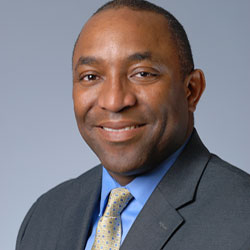
Tochukwu C. Iloabuchi, MD, MS, CMD
Assistant Professor of Clinical Medicine
Indiana University School of Medicine
Physician Member
Why did you choose geriatrics?
I grew up around older adults, and that stimulated my desire to learn more about their medical needs. As I studied medicine, my interest became a passion to specialize in geriatrics. During my training and after I became a geriatrician, I realized how much work there is to be done in our field. I also realized that we have plenty of opportunities to improve the care we provide to older adults.
You split your time between patients and students as a clinician-educator. What’s that like?
Touching the lives of my patients and their families and making a positive difference for them is extremely rewarding. In my practice, being part of interdisciplinary teams and working with dedicated colleagues inspires me every single day. I also love the teaching opportunities my job offers—I enjoy working with different learners and I feel like I’m a teacher in doctor’s clothing.
What’s your AGS story?
I’ve been an AGS member since my fellowship training in 2010. It seemed like a natural move to join—the AGS is the professional home for geriatrics healthcare professionals. Plus, I got a little push to join from my mentor and the faculty of my fellowship program. The opportunities the AGS offers during our Annual Scientific Meetings to share work and network with other fellows was also enticing.
I happen to have a special interest in transitions of care. The AGS helps me connect and work with others who share that passion in the Transitions of Care Special Interest Group. Its members are subject-matter experts who meet to share their knowledge, ideas, and experience.
My AGS membership affords me plenty of opportunities for collaboration, networking, and career development. I’ve made friends outside my own institution and I’ve worked on projects with colleagues I’ve met through the AGS. What’s more, I’ve been able to participate in activities that have contributed to my professional growth, including attending career development courses, finding mentors outside my home institution, and participating in review panels.
What do you like most about AGS Annual Meetings?
Some meetings have been particularly memorable. In 2012, my abstract was selected for an oral presentation. As it happened, the meeting was in Seattle, where my wife’s best friend and some of our family live—so my family got to watch my presentation; that was pretty special.
I’ve only missed one AGS Annual Scientific Meeting in the eight years I’ve been an AGS member. To me, the meetings are like family reunions where I reconnect with friends and colleagues. I get rejuvenated and inspired from hearing about the growing recognition for our work and its relevance in health care. As we engage with each other and get to share what we’re doing, I always learn something new. And I return to my institution with new ideas to share and implement.
Back to Top
